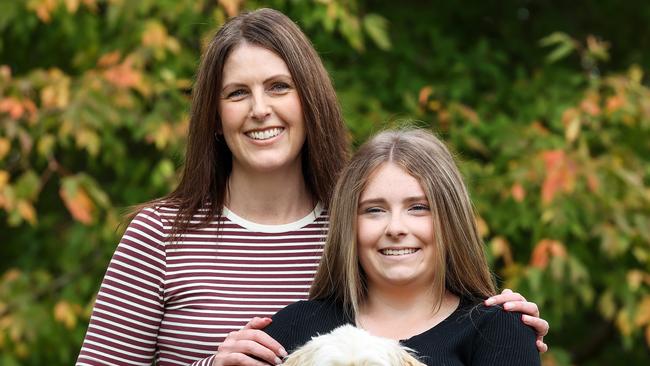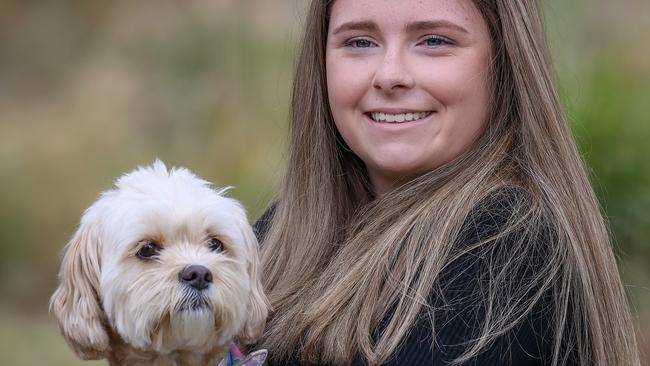Endometriosis Centre at Epworth looks for better ways to diagnose
It is a common condition affecting one in nine women yet researchers are still looking for better ways to diagnose and treat endometriosis.

Victoria
Don't miss out on the headlines from Victoria. Followed categories will be added to My News.
Young Victorian women with suspected endometriosis are being recruited for a new study to see if a less invasive MRI scan can diagnosis the disease more quickly and painlessly.
Endometriosis is a common condition usually identified as causing painful menstrual periods, but experts now say that is just one of a number of symptoms. It impacts the lives of one in nine women and occurs when cells similar to the lining of the uterus, or endometrium, grow outside the uterus.
The Julia Argyrou Endometriosis Centre at Epworth in Melbourne is running an Australian-first investigation called the MRI-ENDO study to see if an MRI scan can be used to successfully diagnose the condition in younger women aged under 25.
Dr Kate Tyson is the director of the centre that was established two years ago by Melbourne’s Julia and Michael Argyrou to help women achieve an earlier diagnosis, find more effective pain management and invest in groundbreaking research.
Dr Tyson, who has endometriosis herself, says this study is to find a more patient-friendly way of confirming the disease in young women.
“At the moment, the best non-surgical way we can diagnose the disease is a trans-vaginal pelvic ultrasound. This is not appropriate for young people,” she says. “We want to find alternate methods to prevent a delay in diagnosis.
“This will evaluate whether MRI is effective by comparing the findings of MRI scans with confirmed surgical diagnosis of endometriosis.”
Dr Tyson says an MRI is more comfortable for the patient, doesn’t involve an invasive instrument and is less user dependent.
“The thinking is that an alternative is needed as currently there is no Medicare rebate for young people seeking diagnostic investigation for symptoms suggesting endometriosis,” she says.
Dr Tyson says researchers are eager to find novel treatments and her team is also looking at the use of cannabidiol (CBD) to help with pain. CBD is the active ingredient in cannabis that is derived from the hemp plant, but is not addictive.
“It is not new for pain, but hasn’t been studied in the endo population,” she said. “We know patients with endo have up to eight additional symptoms as well as period pain and we are trying to design a study that will allow CBD for young people to treat pain; that study is in the design phase.”

She said endometriosis remains a difficult condition to diagnose and treat, in part because of the variable way it presents but also because the symptoms have all been “lumped together” to find one solution for multiple problems.
“There are also problems with people accessing treatments and still ongoing stigma around period pain, it is improving, but still there,” she says, adding it is crucial that women are diagnosed earlier.
“The sooner periods can stop being a focus, taking up bandwidth, young women can get on with just living a fulfilled life.”
March is endometriosis awareness month. For details on the Epworth study, visit: epworth.org.au/who-we-are/our-services/endometriosis-centre
What to look out for:
• If you suffer period pain that stops you doing activities at school, work or leisure then seek specialist advice regarding potential endometriosis
• You should not miss days off work or school from period pain, have it investigated
• Talk to your GP, go empowered and ask if you should be referred to a specialist
Teenager Taya, who asked not to use her surname, missed much of Year 10 last year because of painful periods.
Before being diagnosed with endometriosis, excruciating cramps, severe nausea and vomiting had dominated much of the last four years, impacting everything from school to sport to her social life.
So severe were Taya’s symptoms that the 16-year-old was admitted to hospital half a dozen times and taken to hospital emergency departments by her parents more than 20 times where often her pain was put down to anxiety.
Her mum Nicole does not have the condition, but says endometriosis is common in husband Simon’s family.
“So I was aware of it, and familiar with the symptoms, but it was still hard to get a diagnosis for Taya,” she said.
“The frustrating thing was being told by health professionals the pain was just part of being a woman.”
Taya said there was a lot of that. “I actually had one doctor say I should just wait five years, and then get pregnant and I won’t have to deal with it for nine months,” she said.
Nicole said she was horrified at that comment.
Taya then went to the Julia Argyrou Endometriosis Centre at Epworth where in December she underwent a laparoscopy which confirmed she has endometriosis.
Of the new endometriosis research at the centre, Taya says it makes her hopeful it can make a difference.
Today, cuddling up to her faithful cavoodle Marley who helped her through so much of the pain last year, Taya says life is better now and is happy to be back at school and playing sport.



